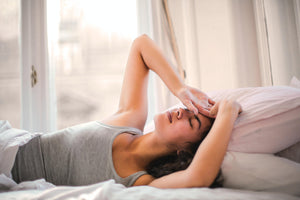Headaches are normal – as annoying and painful as they can be, we all get them from time to time. But some headaches are more than just occasional dehydration, or the one-off cold.
Are you haunted by regular headaches? Do you suffer from migraines? If so, you’re probably trying to narrow down what’s causing them, so you can be rid of them once and for all.
And we hear it all the time – your best friend, neighbor and uncle all get grumpy headaches if they skip that first cup of coffee in the morning.
Yeah – it’s no secret that coffee and caffeine affects our bodies, and that some are more sensitive to it than others. But is there any scientific backing for coffee causing headaches?
Well, in truth, caffeine can both trigger and treat headaches. Sounds complicated? Well, let’s break it down.
How Caffeine Cures Headaches

Caffeine has a range of healthboosting effects, including minimizing the risk of cancer and Parkinson's disease, liver conditions and Type II Diabietes. But caffeine can also significantly help to ease pain and headaches.
Caffeine can accelerate the distribution of nutrients into your bloodstream, which is how it speeds up metabolism. Caffeine itself also reduces inflammation, which can help ease both muscle aches and tension headaches. In fact, consuming caffeine on its own can sometimes be enough to stop the pain in it’s tracks.
Now, it’s important to remember that headaches can be caused by many different things, and caffeine is more effective for some types of headaches than others. Individuals also have varying tolerances for caffeine, so how you react to it may differ from others around you.
Still, it’s undeniable that caffeine is a proven, effective pain reliever that can help with headaches.
How Caffeine Causes Headaches
But like we said, it’s not quite as clear cut as that. Caffeine can also trigger headaches, for example in people who have recently quit coffee, or who suffer from migraines.
Caffeine has the ability to narrow your blood vessels, which is part of how it helps to ease pain. But when the caffeine exits your system and the vessels expand again, this can also trigger headaches.
Caffeine Withdrawal:
If you consume caffeine regularly, your body gets used to consistently getting caffeine. If you then cut back or quit caffeine completely, you can get withdrawal symptoms, one of which is headaches. Of course, there are ways to minimize symptoms of caffeine withdrawal – more about that in a bit.

The Link Between Caffeine and Migraines
The cause of migraines is a question as old as time, and despite the long and ongoing research into it, no one knows for sure why some people get migraines.

Many who suffer from migraines, however, know that there’s a connection between caffeine intake and their migraines. Exactly what that connection is can differ from individual to individual, but it’s well-known that certain foods and drinks can trigger migraines.
Even so, it’s important to understand that neither caffeine nor coffee is the cause of the condition – for some who already have migraines, it can trigger an episode, but it won’t give you migraine if you don’t already have it.
A recent study made with people who suffer from migraines showed that there was an increased risk for an episode among those who drink 3 or more caffeinated beverages a day – but not in those who keep to 1 or 2 per day. In those cases, it could actually aid in keeping headaches at bay during the day. The study also showed that for those who rarely consume caffeine, it takes less of it to trigger a migraine.
And interestingly, nothing in the study showed that coffee and caffeine need to be cut out completely – a sure sigh of relief for many coffee drinkers out there. That said, if you suffer from migraines, it’s worth keeping track of your own habits around caffeine, and how it affects you condition.
Is Coffee Causing My Headaches?
So, how do you know if your headaches are actually because of your coffee habits? Let’s look at some easy-to-spot signs and what you can do to lessen the risk of a coffee headache.
Where are Caffeine Headaches Located?
If you’re trying to figure out whether your headache is because of all the coffee you’ve had, first you need to know where a caffeine headache hurts.

Typically, headaches caused by caffeine withdrawal feels like a pressure that pushes outward from the brain. It often starts behind the eyes and pushes upward, but it can also present with migraine like symptoms, as a widespread, throbbing pain.
Does this sound like you? Here’s a few tips for how to manage it.
1. Track How You React to Caffeine

If you’re a regular coffee drinker and you often get headaches or suffer from migraines, try to keep track of your caffeine consumption and when they coincide with headaches. How we react to caffeine is highly individual, and knowing the connection between your caffeine consumption and headaches can help you work out how to adjust your habits to avoid pain as much as possible.
But remember that caffeine is not only found in coffee. Tea, pain killers, carbonated and energy drinks are other common sources of caffeine outside of coffee, so try to get a complete picture of your caffeine consumption to help you figure out your own tolerance.
2. When Cutting Back on Coffee, Go Slow
When cutting back on coffee, many of us want to quit cold. After all, it’s really hard to constantly be tempted by another sip of rich, heavenly java when you know you can’t have any more. But if you’re used to drinking multiple cups a day, quitting cold is a sure recipe for caffeine withdrawal.
So instead, cut back slowly. Once you’re used to a cup less a day, cut back a little more, and again, remember it’s not the coffee itself but caffeine you want to cut back on – if you switch out your coffee for soda, it won’t have the effect you were hoping for. Go easy on yourself, and consider a quality decaf to replace those cups you’re slowly cutting back on.
3. Stay Hydrated
Caffeine isn’t the only thing that can cause headaches if you’re an avid coffee drinker. Coffee is also a diuretic, which means to can cause dehydration if you drink a lot of it.

Dehydration is another cause of headaches, so if you’re drinking coffee make sure you also gulp down water every now and then. Check out all of our best tips for avoiding dehydration when drinking coffee here.
4. Ice Packs
Sometimes, you just can’t avoid it – the headache hits, despite your best efforts. But there are still some tricks that can help ease the pain.
Ice packs are a go-to for many people living with migraines. Applying one to the area of your head that’s hurting can soothe the suffering considerably. The cold alters the blood flow, and it can numb the area that’s aching – so give it a go.
5. Peppermint Oil
Another thing you can do if you’re suffering from a headache is to apply peppermint oil topically. The active ingredient in peppermint oil is menthol, and research has shown that because of it’s anti-inflammatory and relaxing properties, it can reduce headaches considerably.
A 2016 study showed that peppermint oil can be especially effective for tension headaches – as effective as paracetamol, in fact.
Peppermint oil doesn’t need to be diluted (though you can dilute it if you prefer). Simply massage a couple of drops into your temples or forehead, and you should start feeling a little better soon.
Consider Decaf Coffee
If you’re worried about the effect of caffeine, another thing to try is a quality decaf coffee – without any caffeine or chemicals, it’s as close to a coffee for headaches as you can get.

At Peak State, all our coffee is organic, shade-grown and fair-trade certified, with extra health benefits from adaptogenic mushrooms to maximize what you get out of your morning cup. And our decaf is no exception.
Calm Descent is a whole-bean decaf coffee boasting notes of caramel, sweet grapes and dark chocolate. Infused with adaptogenic Cordyceps and Lion’s Mane mushrooms, it helps to keep your energy levels naturally up and your brain healthy.
Calm Descent is decaffeinated using the Swiss Water Process, the only guaranteed chemical-free method currently available, to ensure a chemical-free, pesticide-free, and jitter-free blend. If it “peaks” your interest, try a free sample shipped right to your front door today!
Psst… how do you avoid dehydration while drinking coffee? Learn our best tips here.

